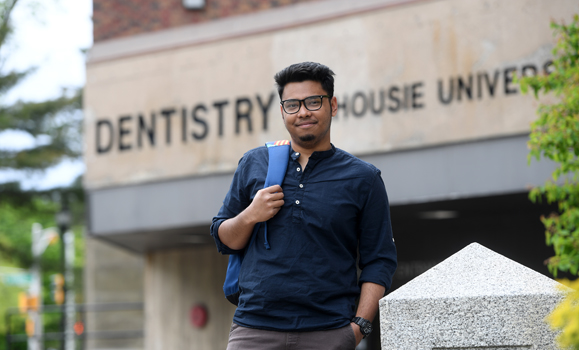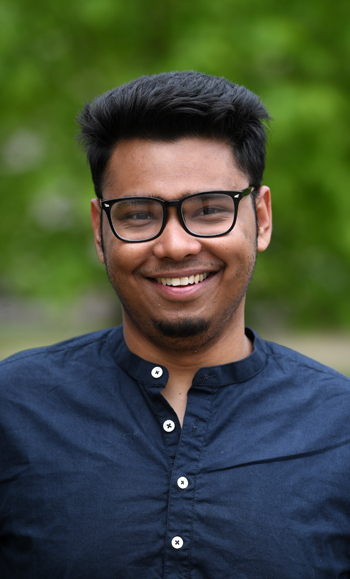This article is part of a series focusing on the grads of the ±«Óătv Class of 2020. Visit our to share in the excitement with our newest graduates.
Agnivo Rakshit (DDHâ20) had never been to a dental hygienist before he decided to become one. But that didnât stop him from falling in love with the profession or finding that it has changed his life forever.
Agnivo was born, raised, and went to high school in Kolkata, India. He visited the dentist, but never saw a dental hygienist. âDental hygiene is quite a new profession in India,â he explains.
From India to Newfoundland
The path to dental hygiene began in Newfoundland. At the age of 18 Agnivo took the bold step of leaving India and starting a BSc degree at Memorial University (MUN). For two years he studied biology and psychology, becoming acquainted with snow for the first time and, despite some initial homesickness, basking in the company of the warm-hearted Newfoundlanders he met.
It was also at MUN that Agnivo began to consider the question, âWhat next?â
When he began studying sciences in St. Johnâs, Agnivo felt strongly that he wanted to work in health sciences, but he didnât know which career path he would pursue. From his experience with dentists, he knew that oral health was a ârewarding field and a good careerâ that involved helping people.
Agnivo began googling careers in oral health and looked at various websites on careers ranging from dental assisting to oral and maxillofacial surgery. Dental hygiene was among the mix of options. It intrigued him and he kept reading more and more about it.
âIn life,â says Agnivo, âyou often donât know what you will like until you try it.âÌę And that certainly proved true for him.

And from Newfoundland to ±«Óătv
Ìę
After his two years at MUN, Agnivo had all the prerequisites for the dental hygiene program and he was accepted at ±«Óătv.
Right from the start, he knew he had made the right decision. âI had wonderful instructors,â he says, âand they made me fall in love with this profession. They were my mentors, my professors, and they helped me every step of the way.â
Thatâs not to say it was easy. In the first semester there were 10 subject courses. Not surprisingly, it was overwhelming to being with. There was also the hands-on training, which was completely new, but also intriguing to Agnivo.
âI found myself very curious about the dentiforms and the instruments,â he says. âIn dental hygiene, itâs not enough to have a good theoretical knowledge. You need to know proper techniques as well. I found that practice, dedication, and a love for your work made it easy to learn.â
Seeing patients brought new challenges, such as time management. âI needed to learn how to multi-task and balance caring for my patients with building my speed and other tasks like recording information,â he explains. âMy instructors helped me a lot with this.â
The best part of the job, says Agnivo, is making people happy. âIt is a very satisfying profession because when you have debrided someoneâs teeth, removed all the calculus and biofilm, they smile better and with confidence.â
Many lessons learned
Important lessons were also learned on the many rotations dental hygiene students go through. At the New Immigrant and Refugee Oral Health Clinic, Agnivo says that he learned about the cultural aspects of care. For many of the clinicâs patients, the oral health care they received in the Dal clinic was the first they had had in a long time.
âNot only did we have to treat their oral conditions, but we had to help them understand our profession and the importance of good oral health care,â says Agnivo.
A rotation in the paediatric clinic at Harbour View Elementary School gave Agnivo exposure to looking after children. As an only child and with no real experience with children, he says this was something he needed. He feels treating children gave him new communication skills and taught him to be more patient.â
Treating elderly patients, some with dementia, at the Camp Hill Veterans Memorial Building also provided valuable lessons.
âYou learn to correlate life and health to oral health,â he says. âDental hygiene teaches you that.â
More than classmates
Reflecting on his two years in the School of Dental Hygiene, Agnivo says that he has made friends for life and that being the only male student in the class was a âspecial privilegeâ.
âAs dental hygiene students, we go through good and bad times together and work on each other before we treat actual patients. That involves a lot of trust and it creates a special bond between all of you. You become more than classmates.â
The process of becoming a dental hygienist has given him a lot, Agnivo feels. âIt goes beyond knowledge and seeing patients. It teaches you life skills and shapes you as a person.â
Agnivo plans to work in Nova Scotia when he receives his license and at some point in the future return to Dal to study for his bachelor of dental hygiene degree. He is very âproud and happyâ to be part of the Dal family.
âDal is one of the best universities in Canada,â he says. âIt has been a privilege to study here and be a part of it.â

